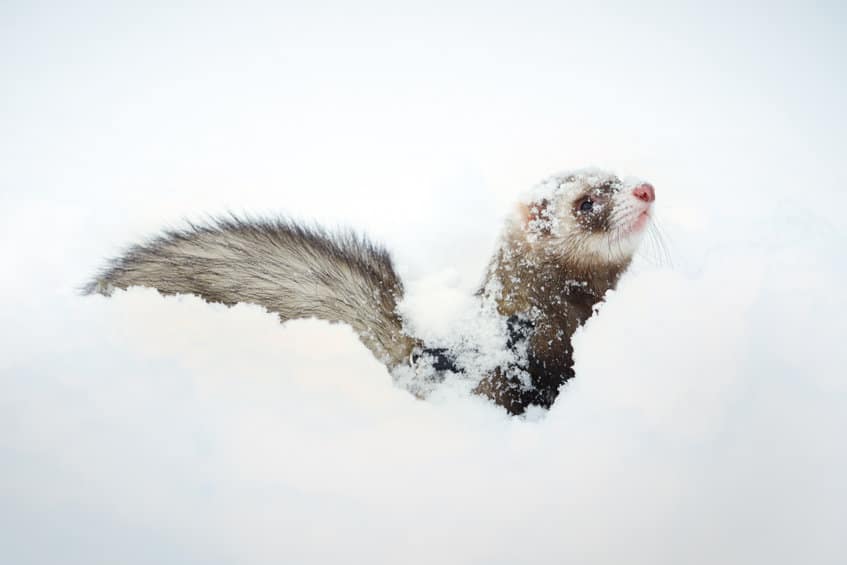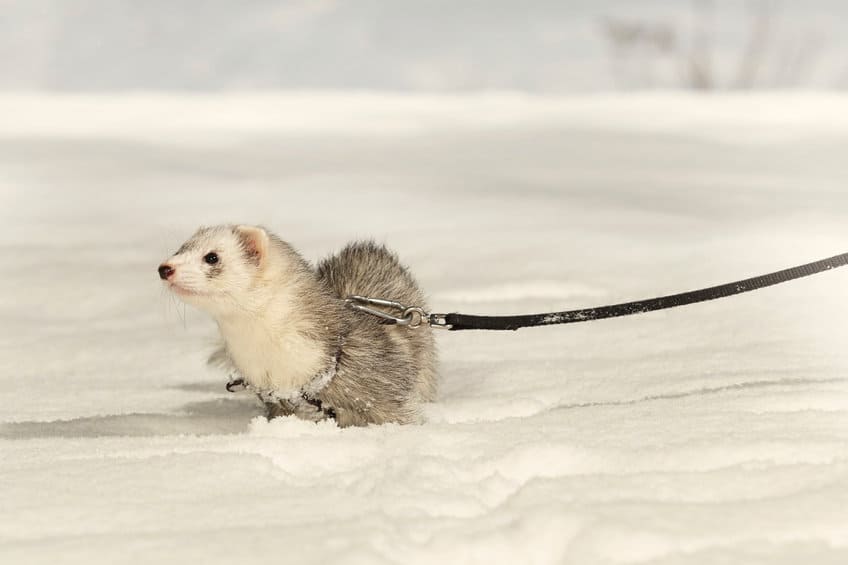As winter approaches, you might be wondering whether or not your ferret would enjoy spending some time out in the snow, and the truth is, many ferrets do really like playing in the snow. However, there are several different things you need to keep in mind to make sure that your ferret stays safe.
In this article, we are going to take a look at what ferrets like about the snow, in addition to some different safety tips and tricks to keep in mind this winter and when it snows.
Do Ferrets Like Snow?
The short answer to this is yes; ferrets generally like to stay and play in the snow. Ferrets usually really enjoy colder temperatures, and they love to dig. Snow is a really great substance for digging and tunneling, so when a ferret sees the white stuff for the first time, he generally likes to burrow and spend time burying himself in snow.
On the other hand, each ferret is different. While many ferrets really love to be outside in the snow for as long as you will let them, some ferrets are freaked out by the snow and may find it very uncomfortable.
The good news is, it will likely be really easy to tell whether or not your ferret likes the snow. If he is excited and playing, he probably likes it. If he is just standing still or trying to get away from it, he probably does not.
How Long Can Ferrets Stay In The Snow?
Snow can be a lot of fun for your ferret, but you generally do not want to leave them outside in the snow for more than thirty minutes. There are a couple of different reasons for this. First, it is possible for your ferret to get too cold, and hypothermia can be very dangerous for ferrets.
However, there are also other potential problems to be on the lookout for. For instance, the air is often very dry when it snows or in the winter in general, which can cause your ferret to become dehydrated much faster than he usually would. Dehydration can be fatal for ferrets if not caught and fixed quickly.
How Cold Is Too Cold For a Ferret?

Ferrets actually really enjoy being in the cold because of their furry coats, so it is a lot harder for your ferret to become too cold than it is for your ferret to become overheated. You may have heard the statement, “if you are cold, they are cold,” before, but that actually is not the case with ferrets.
However, like all animals, they do have limits when it comes to the chilly temperatures they can withstand. Any time temperatures get below freezing (below 0 degrees Celcius or 32 degrees Fahrenheit), your ferret could be in danger of becoming too cold.
At these temperatures, you should definitely keep your ferret inside except for short outings. Just make sure you do not heat your house to the point where you have the opposite problem (heatstroke.)
Tips When Taking A Ferret Out In The Snow

Taking your ferret out in the snow can be a lot of fun (if your ferret likes playing in the snow), but you want to make sure that you do it safely. Follow the tips below when you are playing with your ferret in the snow.
1. Take Safety Seriously
There are several safety things that you need to keep in mind when letting your ferret play in the snow. First, you should always keep your ferret on a leash. Ferrets are known to love tunneling, and it is really easy for them to do so in the snow. If your ferret starts to tunnel, he can get away from you really fast if he is not on a leash.
You also need to be sure that you keep your ferret away from any chemicals that may be on the street or sidewalk to melt ice or snow, as they can be toxic to ferrets.
Finally, you want to keep your ferret away from any sledding people as you do not want your ferret to get run over.
2. Short Increments
Ferrets, especially ferrets that are used to being indoors, should not be kept out in the snow for long periods of time. Generally, you want to keep any snow outings to about thirty minutes or less.
Your ferret may also become too cold faster than thirty minutes, so you should look out for signs that your ferret might want to go in, like shivering, pawing at the door, standing on his hind legs, or trying to climb up your pant leg.
3. When You Go Back Inside
When you head back inside after playing with your ferret in the snow, you want to make sure that you have a warm blanket or towel ready to wrap your ferret up in. This will both help your ferret warm back up, and it will allow you to make sure that your ferret dries off completely.
Tips To Keep Your Ferret Warm In Winter
If you are keeping your ferret outside or if you lose power or heat in your house, you are going to have to be extra careful to keep your ferret warm. Remember, even with all of these tips, if it gets too cold outside, you should always bring your ferret inside.
1. Lots of Blankets
During the winter, especially if you lose power, adding extra blankets and bedding to your ferret’s cage can help him stay warm. He will be able to burrow down inside of them for some extra insulation in addition to his winter coat. You can also cover the enclosure with a blanket to help trap heat; just make sure your ferret is still able to get air easily.
2. Check His Water Regularly
If your ferret is outside or if you lose power, you want to regularly check to make sure that your ferret’s water does not freeze. If your ferret gets dehydrated, this can cause a lot of problems. If your ferret is outside and the water is freezing, that is a good sign that it is time to bring your ferret inside.
3. Consider Housing
If you are going to house your ferret outside, you are going to want to make sure you provide your ferret with proper housing. Two great options are either a shed or a hutch.
Sheds will keep your ferret protected from weather conditions, and many often have insulation to help keep your ferret warm. Hutches, on the other hand, are off the ground, which can help prevent your ferret from getting too cold, and they usually come with a run, so your ferret has a place to play and explore. Make sure that the bottom of whatever structure you use is wood or concrete so your ferret cannot dig out.
4. Ferret Friends
If you have two or more ferrets, they will be able to snuggle up next to each other in the winter. This will help them stay warm, and it is really cute. Having multiple ferrets is especially important if you are going to keep them outside sometimes because ferrets are very social creatures and will get bored or lonely if left alone for too long.
What Temperature is Ideal For Ferrets?
How Do Wild Ferrets Survive In The Winter?
Ferrets are not known to hibernate, yet there are several different changes that wild ferrets (also known as polecats) go through that help them survive during the winter, in addition to a couple of key habits.
First of all, as winter approaches, most ferrets begin to gain weight. This helps them stay warm and provides them with extra energy storage if finding food becomes difficult.
They also shed their light summer coat for a thick and really warm winter coat that allows them to stay comfortable as the temperatures drop.
As far as habits go, wild polecats in the winter spend a lot of time underground. This helps them stay warm, and they will often stay in the burrows of other animals so they have immediate access to food when they need it without having to go above ground. They may also live in groups so that they can cuddle up next to each other for warmth during cold nights.













